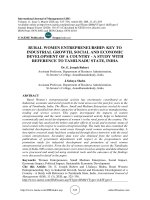Economic growth and economic development 161
Bạn đang xem bản rút gọn của tài liệu. Xem và tải ngay bản đầy đủ của tài liệu tại đây (48.73 KB, 1 trang )
1.5
Introduction to Modern Economic Growth
ITA
Calibrated productivity differences 1988
0
.5
1
ESP
PRT
FRABEL
SGP
HKG
IRL
AUT
NLD
CAN
CHE
FIN
SWE
DNK
GRC
URY
PAN
COL
ISR
NOR
JPN
NZL
PAK
IDN
LKA
0
BGD
THA
.2
.4
.6
Estimated capital-productivity differences
.8
1
Figure 3.7. Comparison of the capital productivity estimates from
the Trefler approach with the calibrated productivity differences from
the Hall-Jones approach.
of reality and that in fact there are significant productivity (technology) differences
across countries. Interestingly, however, Figure 3.7 shows that the relationship between the calibrate it productivity differences in the capital-productivity differences
is considerably weaker.
It is also important to emphasize that Trefler’s approach relies on very stringent
assumptions. To recap, the three major assumptions are:
(1) No international trading costs;
(2) Identical homothetic preferences;
(3) Sufficiently integrated world economy, leading to conditional factor price
equalization.
All three of these assumptions are rejected in the data in one form or another.
There are clearly international trading costs, including freight costs, tariff costs and
147









